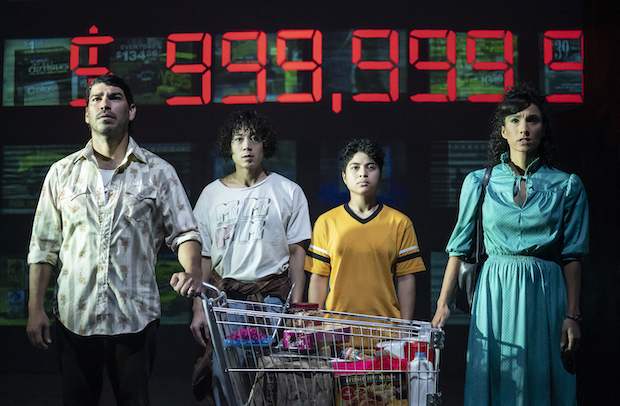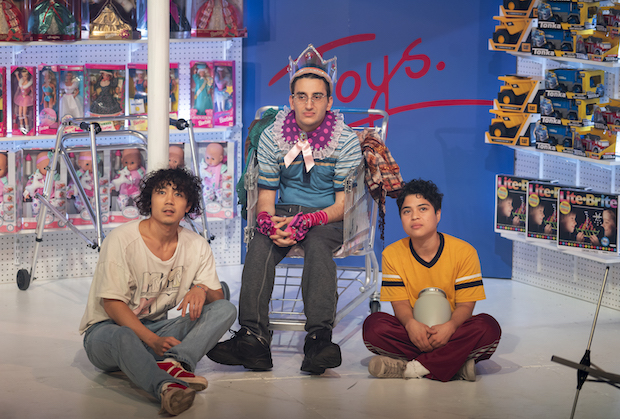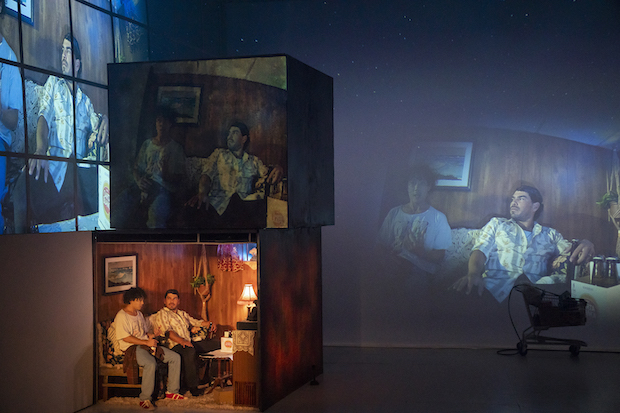Review: Walmart and Other Distractions for an Immigrant Family in American (Tele)visions
Theater Mitu and New York Theatre Workshop presents the world premiere of Victor I. Cazares’s play.

(© Joan Marcus)
If the New York City-based company Theater Mitu could be criticized for anything, it's being experimental to a fault. As outwardly impressive as recent productions like Remnant and House were in its multidisciplinary ambition, the company's voracity for mixed media often ended up smothering human feeling and thematic resonance. It's a relief, then, to report that their latest show, american (tele)visions (styled purposely in lowercase), while not entirely free of their excesses, comes across as the least airless and most emotionally direct of their recent work.
Set during the 1990s, Victor I. Cazares's play could best be summed up as a dreamscape that explores not only the difficult realities of American life that befall a family of undocumented immigrants from Mexico, but also the ways these family members try to escape those realities. Those circumstances are fairly familiar by now, with patriarch Octavio (Raúl Castillo) barely being able to support his family with his factory job, a plight whose emotional and physical toll inevitably trickles down to the rest of the family.

(© Joan Marcus)
The tomboyish Erica (Bianca "b" Norwood) finds refuge in video games and her own imagination, conceiving of herself as a "Hero of Ages Lost" rescuing her family members from their troubles. She also imagines herself as one of a pair of detectives on a TV show called Crazy Inspectors along with her gay best friend Jeremy (Ryan J. Haddad), who himself has a thing for Barbie dolls.
The means of escape for her other family members are more mundane by comparison. Octavio simply watches TV whenever he isn't working, while frustrated matriarch Maria Xinema (Elia Monte-Brown) cheats on her husband with a truck driver. Then there's Jesse (Clew), a Vietnamese friend of the family who was something more than that for Erica's brother, Alejandro (also Clew), who died in a work accident before the events of the play.
None of these character arcs are told through conventionally naturalistic means. From the start, Cazares interweaves fantasy and reality, throwing us into their multidimensional universe as they gradually expose the truths of these characters and their hardscrabble lives. Fitting that, in the "production bibliography" that has become customary for Theater Mitu productions, the recent hit film Everything Everywhere All at Once, which used the concept of a multiverse as the domain for a familial drama, is cited as an inspiration.

(© Joan Marcus)
This is prime multimedia territory for Theater Mitu founding director Rubén Polendo. Bretta Gerecke's set design may look austere at the beginning: four large cubes within a walled-off angular stage. But that turns out to be merely a canvas for the "technology design": a barrage of video projections and aural soundscapes conceived by Kelly Colburn, Alex Hawthorn, and Justin Nestor that run the gamut from freshly imagined 8-bit games to snatches of Walmart advertisements. Jeanette Oi-Suk Yew contributes some imaginative lighting design: Her use of a mere pair of lights to suggest vehicle headlights is especially memorable. Also, Gerecke and specialty costume designer Mondo Guerra have come up with one showstopping costume for Monte-Brown in the show's climax.
Walmart is a crucial part of Cazares's mosaic, and the source of the play's keenest insights. That behemoth U.S. superstore chain has been so much a part of our lives that most of us take its existence for granted. By setting their play in a time when Walmart was still merely a regional chain, american (tele)visions reminds us of the way it was viewed by Americans and non-Americans alike: as a haven theoretically housing everything you could possibly want in your life, all within your grasp. The members of this family see their various salvations within the objects — TVs, Barbie dolls, video games, and the like — that Walmart sells. They are their own consumerist versions of the American Dream. Without stinting on capitalist critique, Cazares offers a potent reminder of what that brand name means to some people, particularly immigrants, undocumented or no.
As is often the case with Theater Mitu productions, the sheer technological abandon of its staging threatens to overwhelm the human stories at its heart. Thankfully, the cast of american (tele)visions generally manage to cut through the figurative noise: Norwood full of energy and wonder as Erica, Castillo and Monte-Brown brimming over with frustration as the parents, Clew an oasis of fraternal warmth as both Jesse and the late Alejandro, and Haddad a scene-stealing force of nature in his handful of appearances. And the experimentation of Polendo's production at least feels bracingly playful rather than grimly serious. For once, Theater Mitu has come up with a production that is bound to appeal to both the head and the heart.









